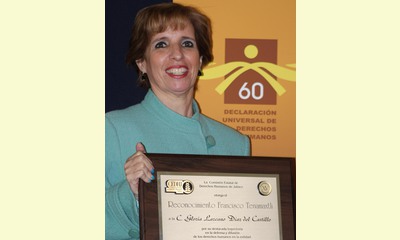|
|
Ending impunity in Jalisco
un article par Raúl Aguilar Aguila Cheang and Tonio Tessada
Impunity is a well-known concept by all Mexicans. Although Mexico has made significant achievements in promoting respect for human rights by signing and ratifying international treaties in this matter, as well as adapting their legal framework, impunity here remains notorious worldwide.

Gloria Lazcano, Secretaria Técnica of CECDPNNA (Foto: Secretaría de Desarrollo Humano)
click on photo to enlarge
This is not a problem unique to Mexico. Societies around the world are challenged to make sure that laws are not just "ink on paper", in other words, make them a reality.
In Jalisco, a state west of the country, efforts are underway to harmonize its laws, that is, new laws are being created or adapted according to the treaties that Mexico as a country has already signed and ratified. Here, we discuss a proposal for monitoring and supervision that may be changing things in relation to accountability for children.
The Convention on the Rights of the Child was signed and ratified by Mexico in 1990. Since then, it has received comments from the United Nations Committee on the Rights of the Child, promoting changes in some Mexican states like Jalisco, where the State Coordinating Committee for the Development and Protection of Children and Adolescents (CECDPNNA for its initials in Spanish) originated in 2003. It was created based on these same observations, and made precise by the Law on the Rights of Children and Adolescents in the State of Jalisco, which came into force that year.
The CECDPNNA represents an important step in accountability because it is a body to oversee and monitor the effective implementation of the law, with the authority to engage in design and assurance of adequate resources to develop policies for rights advocacy.
The most important achievement by CECDPNNA has been the effective engagement of different sectors of society in its work and decision-making, becoming a practical alternative for accountability of all levels of government to the society involved.
Ending impunity, ending the repetition of acts that violate our rights, requires our vigilant participation as a society. It is not enough to have laws that recognize our rights. We have to make them a reality through application of practical tools such as this one which benefits our children and adolescents.
(Click here for a Spanish version of this article)
|








|
DISCUSSION
Question(s) liée(s) à cet article:
Rights of the child, How can they be promoted and protected?
* * * * *
Commentaire le plus récent:
The Convention on the Rights of the Child was adopted by the United Nations General Assembly in 1989, as an important addition to the Universal Declaration of Human Rights.

|
|









